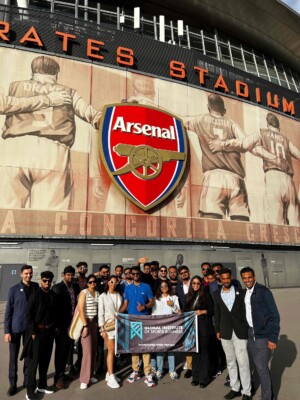Sport Management education has been a popular profession in the West, and the emergence of sports leagues, grassroots sports and tournaments in India has resulted in a growth in demand for sports-related careers. It is no longer seen as merely a recreational activity; rather, the ever-increasing excitement for sports has pushed it to the status of a high-flying career in India, particularly after the establishment of various sporting events such as the Indian Premier League, Indian Super League, Pro Kabaddi League, Premier Badminton League, to name a few, combined with large scale investments in sport made by conglomerates such as Reliance, JSW, Tata, Adani and many others.
Sport Management is one such career option related to the realm of sports, a career with numerous opportunities to grow and reach new heights. In this article, we will examine the important aspects of sport management as a career path before outlining the benefits of attending the Global Institute of Sports Business (GISB) in India to further your sports education.
Why should you pursue a profession in sport management?
Sport management is a multifaceted field comprising professionals with diverse skills, including athlete interaction, administration, marketing, business development and operations. Common attributes among these individuals include a genuine passion for sports and a keen understanding of the industry’s unique commercial dynamics.
Successful sport management experts not only have a passion for the game, but they also have a strong commitment to collaboration. The industry attracts those who are driven by a strong desire for achievement, understanding that winning championships and leaving a legacy demands a collaborative organisational effort that extends beyond the spotlight enjoyed by sportsmen. Expertise, passion, and a common commitment to broad team or organisational goals are required for excellence in sport management.
Education Qualification
Candidates interested in employment in sport management must have varying degrees of education and experience. Entry-level opportunities are available for graduates with bachelor’s degrees. To advance in their careers, individuals must have a Master of Business Administration (MBA) or a certification in a relevant field of study. Students who want to work in the sports industry should study business law, marketing, finance, public relations, and accounting.
Managing teams, event management, sports venue management, and recreation management are all possibilities in sport management. A sport management education programme can help specifically students to pursue professions in sport management as per their requirements.
Benefits of pursuing a career in sport management
Promising career options exist for students pursuing sport management programs, which not only offer employment but also impart important skills in areas like sports finance and business, sport management policy, media and press communication, sponsorship and broadcasting, etc. They also can work with some of the top sporting organisations globally.
Shaping a career in the sports industry
Candidates pursuing a career in sport management possess a strong foundation in business and exemplary communication skills to effectively convey their enthusiasm and ideas. Business acumen is essential, as sports experts continually focus on the bottom line, demonstrating sales proficiency, negotiating strategies, and public relations expertise.
In the fast-paced area of sport management, where theoretical understanding and real-world application must be balanced, practical interpersonal skills are essential and sports education can enable students to acquire the desired skills which requires a sincere love of sports, fitness, and leisure.
An entrepreneurial spirit is highly valued in the progressive sports management landscape, where innovation and seizing new opportunities are paramount. Successful sports managers consistently seek ways to enhance their performance and set new benchmarks.
Sport management extends beyond victory, encompassing community relationships and teaching knowledge to potential players, therefore collaboration skills are vital. In the sports industry, maintaining a consistent focus on providing a great client experience is critical.
Sport Management Growth Prospects
The trajectory of sport management in India has grown at an exceptionally remarkable rate. Several reasons have contributed to the considerable growth in the subject of sport management. In particular, the expansion of athletic events and leagues has created a greater demand for skilled individuals capable of successfully navigating and directing these increasingly complex operations. Second, the increasing popularity of sports programming on television has acted as a catalyst, attracting the attention of millennials and motivating them to consider jobs in sport management. Furthermore, the transition from a single-sport nation to a multi-sport nation has significantly widened the spectrum of opportunities in the profession, providing different pathways for aspiring students to flourish in sports administration.
Is there a scope for sports management?
Studying sport management in India offers numerous advantages that make it a better choice than pursuing education abroad. From the cultural and contextual relevance to cost-effective programs, quality education, practical experience, mentorship, networking opportunities, and exposure to global sports events, India provides a comprehensive and enriching environment for sports enthusiasts. As the Indian sports industry continues to grow and evolve, the country has become a leading destination for those seeking a fulfilling and successful career in sports. GISB is renowned for its industry-centric curriculum, experienced practice-led faculty, and extensive placement support, making it an excellent choice for those aspiring to excel in the world of sports. Your journey to a fulfilling sports career begins here.


































































































































































